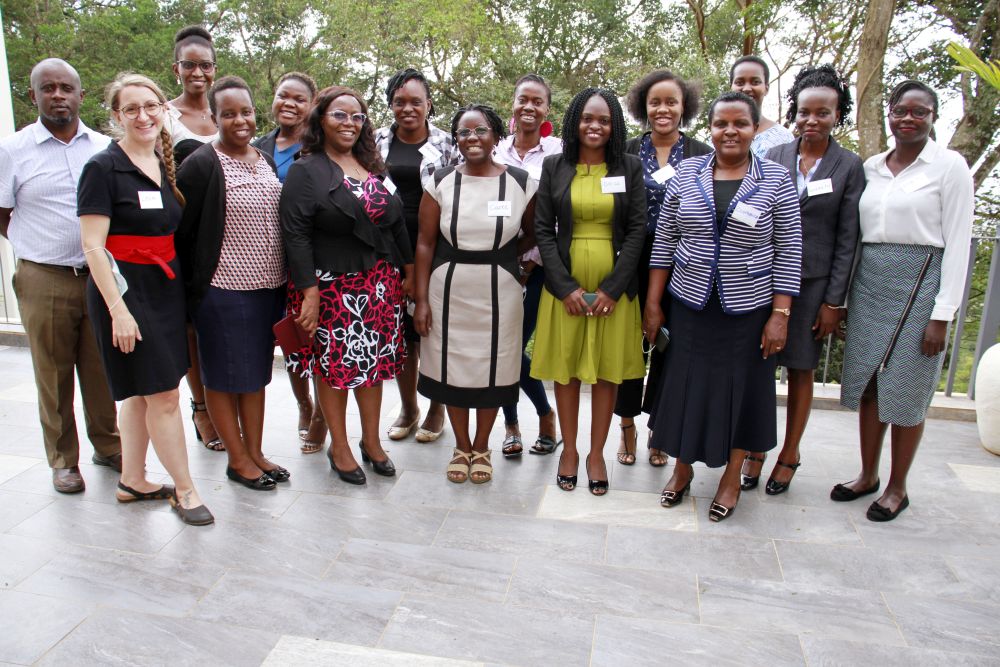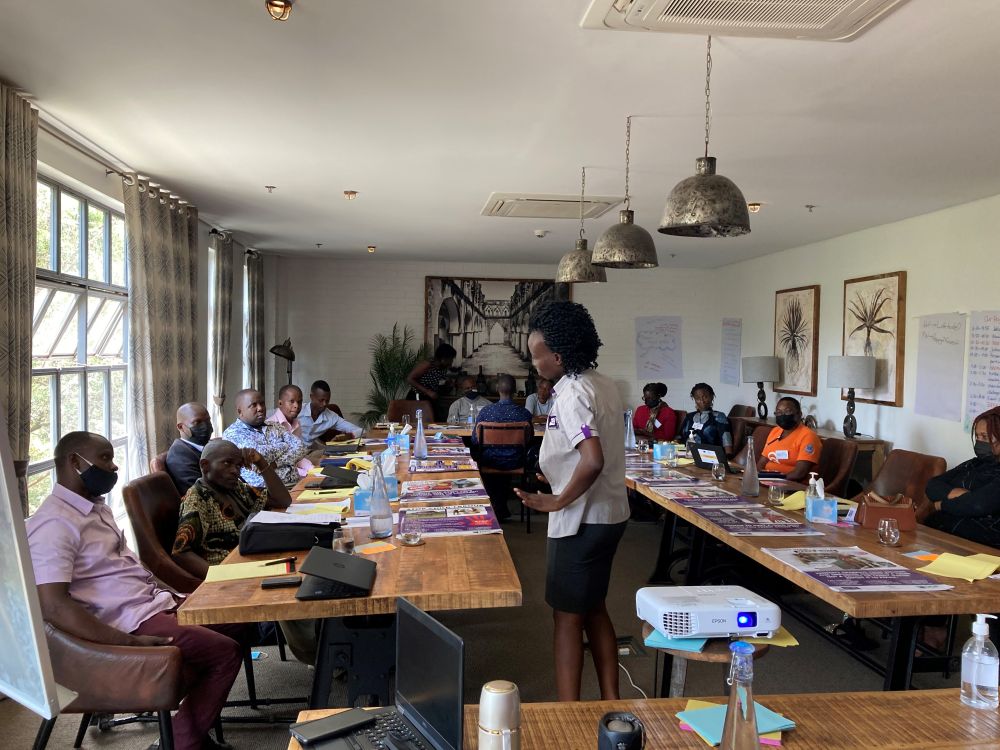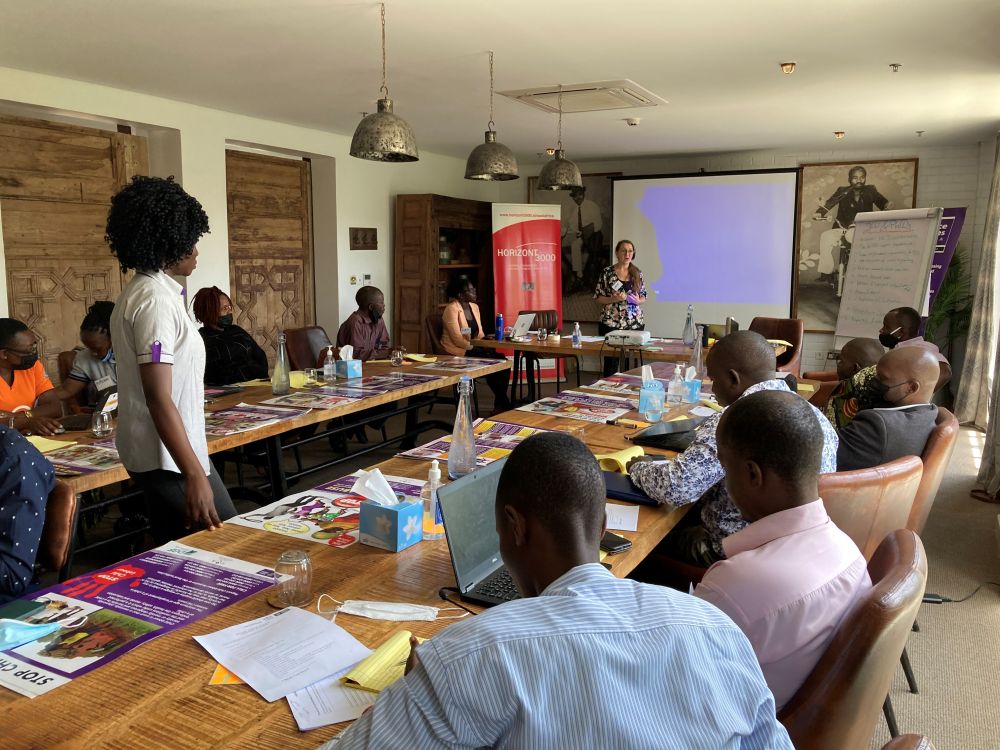Make Your Experiences Count. They Can Change the World.
LET’S BRING ALL OF OUR KNOWLEDGE AND EXPERIENCES TOGETHER.
TOGETHER WE KNOW MORE. TOGETHER WE ACHIEVE MORE. TOGETHER WE DO BETTER.
LET’S BRING ALL OF OUR KNOWLEDGE AND EXPERIENCES TOGETHER.
TOGETHER WE KNOW MORE. TOGETHER WE ACHIEVE MORE. TOGETHER WE DO BETTER.
Published: September 28, 2022
4 days. Around 40 organizations. Lots of learnings and at least one life changed. Angela Mwanje, the Advocacy and Communications Officer of our Partner Organisation Justice Centres Uganda (JCU), is happy about how the exchange event they organized this year turned out. It created new partnerships, new opportunities and new goals to reach.

Starting off, I would like to know how you came up with the idea of the exchange event? Was there a specific need that you wanted to meet? And how did you choose the organisations that you invited to the workshop?
So we are actually talking about four workshops. It was a series of exchange events. We Justice Centres Uganda (JCU) provide critical legal services to people who cannot afford the services of a lawyer – basically the poor, the vulnerable, and marginalised. So while we’re implementing the free legal services for them, we realized that there are certain gaps in supporting our clients in a sustainable holistic way – to be precise we had identified four gaps: psychosocial support, services for persons with disability, the area of women’s rights and the area of sexual and reproductive health. What would often happen was that we came to understand that our legal services were not enough for our clients to really change their situation. In order to make our support holistic, we were lacking competences in those areas.
To give you an example: A person that seeks our services very often needs psychosocial support as well. In many cases they are survivors of domestic and/or sexual violence. They might be harassed at work, involved in land property disputes or a fight of family matter regarding administration of estates – all of that takes a toll on people’s mental health. Depression, anxiety, worries are constant companions for many of them. Our lawyers are not equipped to provide the overall support they require. In terms of psychosocial services, they can only provide the bare minimum really – which is kind of obvious considering that we are speaking of a proper profession. We knew we needed to come up with some sort of solution that would fill the gap and make psychosocial assistance possible for our clients.
Even if we are trying to give the legal services, if someone is not mentally fit to be a witness in court or to go through one month, two months of legal processes, our services won’t make a difference. For someone who has been facing domestic violence or other forms of abuse it is too much to ask of them to step up and give evidence in court without the necessary psychosocial support. And even if they manage to bare the trial without psychological assistance, even if they win the case, sometimes it is just not enough. We have had clients who in the end just disappeared, they never showed up again or ended up going back to the violent relationship for instance.
So this is when it became clear to us that we needed to reach out to other NGOs specializing in areas that our services cannot possibly cover – in these cases that is psychological support.
What about the gap regarding persons with disabilities? How did you notice that this was an issue requiring more than legal services?
Well, we reach out to persons with disabilities in various ways and talk to them about their legal rights. While doing that, we realized that there were issues that came up repeatedly, which were beyond legal action. And actually, those issues make up the biggest part. We are talking about the bare minimum of assistance here – a wheelchair for instance. Often times they are facing an incredible amount of discrimination in pretty much all aspects of life – professional and personal. So we wanted to start collaborating with organisations that could cover medical services, mobility devices, capacity building etc. to make their lives better and improve their chances of a proper income.

Another gap you identified deals with women’s rights. Are women a main target group of your services you would say?
Definitely, yes! Quite a number of our clients are women: women whose land is being taken away by relatives, women whose inheritance rights are not respected, women who are facing abuse. In these cases, while you are representing their legal case everything is fine. The problem begins with the aftermath of winning the case for example. They have to go back to the communities they might have been fighting against. In some cases they have to go back to in-laws or families who wanted to take away their properties. That is why we wanted to partner with women’s rights organizations that provide alternatives like a shelter for instance – ideally, a shelter that equips them economically as well, since that has been the greatest gap when it comes to women’s rights. A lot of our clients go back to abusive situations because of the financial dependency on their partners or families. If it wasn’t for the economical constraints, most of our clients would leave their abusive relationships in a heartbeat. Since they are not economically independent, they often don’t have alternatives.
So this is what we have to focus on with our collaborating organisations: they have to equip the women with skills that can empower them economically so that they have opportunities for employment and an independent life.
I guess women’s rights is a field that is very closely intervened with the fourth gap that you discovered?
Exactly. We are facing the challenge of talking to communities about sexual reproductive rights, which still is a taboo. That makes it even more important to reach out there and talk about it. These topics, however, require someone qualified to actually raise awareness and make an effort in the educational work related to it. In the past, experience has shown that sometimes it works better to organise workshops just for women and others just for men. We have also noticed that often times men will only listen to fellow men. This is how the need of a male speaker was identified, when it comes to sexual reproductive issues. Now we have a man speaking to men about sexual and reproductive rights.
In the end, covering all of these four areas is actually fundamental in order to not have our clients come back a second time, since their situation hasn’t really improved in the long run. If they are not supported in these areas as well, they will still have to face the same core issue. That’s the reason why we strive to improve our legal services to meet the needs of our clients in a holistic way and partner up with organisations that are specialised in these key areas.
Was it very challenging to get the other organisations on board? Did you have to struggle to get their awareness? Maybe you could tell us a bit about that process of organising the exchange workshops.
Alright, so first of all we made a list of some of the organisations we already knew about, but we also did quite some research online. As easy as that might sound, it really wasn’t. We found out that there was no database of organisations on a national level. There just wasn’t any directory that we could refer to in order to find organisations or medical institutions that would help us cover the four areas identified.
After having found the right organisations – which was the most time consuming aspect of the entire process – we sent out invitations telling the organisations about JCU, what the exchange event was all about, what we wanted to achieve. Not all of them were all in from the very beginning. What helped us to convince them were our services. We are offering what all of them need: free legal services for their clients. That was our biggest selling factor.

Did you come across similar networks like the one you were trying to establish? Or did you find it was something completely new having organisations of different technical fields partner up to solve their clients problem in a holistic manner?
They are there, but the problem is that there are so many fragments. They’re so fragmented due to geographical conditions. They mostly end up in a small community that works on a regional level. Some do connect on a national level within the same field they are operating though. In other words: Organisations operating in the same regions or in the same field would know each other, but not beyond those lines. What’s missing is an up to date directory in order to make broader networks possible.
It sounds like it was already quite a task to even get the contact details of the organizations. How many organizations did you get to join your cause?
In total, there were twelve women’s rights organizations that showed up. Eleven organizations covering the issue of reproductive health rights attended. Nine organisations from the field of psychosocial support participated and around ten organisations that work with persons with disabilities.
All of them actually knew what they were getting into even before arriving at the event. We had sent out the information of what we were able to offer and what we were looking for. So many came prepared to share how we could collaborate in a complementary way. It was very nice, because the event not only initiated a collaboration between JCU and the invited organisations, but also the organisations started to discuss how they could work together amongst themselves.
What would you say are your main takeaways from the exchange event?
Sometimes we assume we know what everyone else is doing. By organising events like these, you realise that there is always something you can learn from others – even the very small organisations. We might have underestimated them a bit and were very positively surprised by their work. For instance one of them is located in a socially disadvantaged area and provides teenage mothers with the basic necessities: meals, clothing for the babies etc. It turned out that a lot of the participating organisations were very interested in what they had to offer. We realized that they had a strong impact in their communities. So this leads me back to highlighting the importance of a directory, where you can search for services and get in touch with organisations offering them.
Another takeaway worth mentioning was the feedback we got from the participants – not just regarding the event, but also in terms of our services. Some of them had previously referred clients to us, so they were able to share their experiences they made with us. We collected positive and negative feedback – both helps us to keep improving and developing our legal services. As a side effect the event increased the visibility of JCU, which is of course quite beneficial to our organization. In the end, we were even able to launch mobile legal aid clinics together with a participating organization as a direct result of the event. There are more and more opportunities arising since we organised the exchange, just because now we know all the others are out there, willing to partner up. We just got another invitation to attend a key event organised by of the National Association of Women Organizations in Uganda. I guess, we can say the exchange ended up being a success.

Congrats! It really sounds like it! Is there anything you would recommend to other organizations that are planning to launch a similar event? Anything you might have liked knowing before you started the whole process?
I guess it comes down to knowing your strength in the sense that you need to provide benefits for the other organisations. It won’t work if your invitation will just keep them from their desks. You need to offer them something they actually need – like in our case: free legal services for their clients.
What was your personal highlight from the exchange?
The biggest thing for me was the fact that we saw the positive results immediately. One of our clients, a teenage mother, was able to receive financial support because of the collaboration with the organisation that provides shelter and financial assistance to teenage mothers. The exchange and its consequences were actually life changing for this young woman and her baby. That was definitely my highlight and is motivating us to keep building these strong networks.